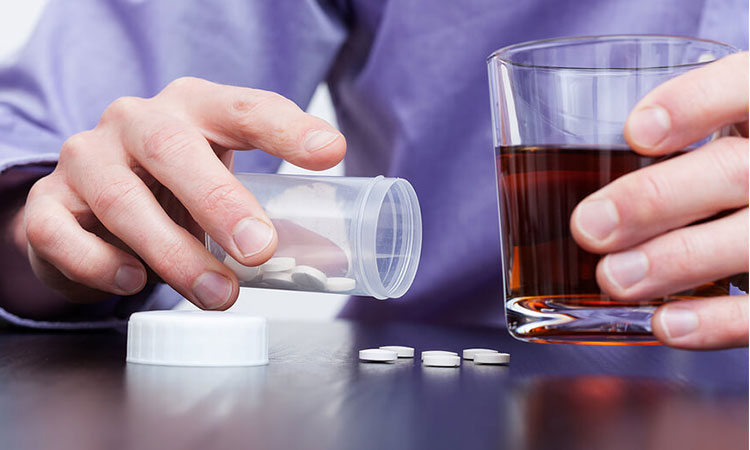
People who use Zoloft and alcohol in conjunction may experience suicidal thoughts, dizziness, nausea, extreme anxiety, headaches, digestive problems, and impaired coordination. Also, the effects of drinking alcohol such as impaired judgment and motor skills or slowed/slurred speech can become more apparent when taking sertraline. Because the interaction between Zoloft and alcohol can be severe, unpredictable, and dangerous in some cases, it is recommended that Zoloft patients strictly limit alcohol use or abstain completely.
Zoloft is the brand name for the antidepressant drug sertraline and is one of the most common prescription medications in its class used today. Zoloft is most often prescribed to minimize symptoms of depression, anxiety and panic attacks, and premenstrual dysphoric disorder.
For those who experience one or more of the above conditions, Zoloft can help improve mood, increase appetite, and decrease fear or anxiety. Zoloft can also be useful for the treatment of obsessive-compulsive disorder by reducing the urge to engage in rituals and repetitive behaviors.
Sertraline is classified as an SSRI (selective serotonin reuptake inhibitor) that works by balancing the levels of serotonin in the brain. Serotonin is a chemical message that helps regulate mood, social behavior, appetite and digestion, and sleep. For those who are experiencing depression or another mood disorder, balancing serotonin can be an effective solution.
At the time of this writing, Zoloft and generic sertraline are available by prescription only. Zoloft is a small tablet that is taken orally once daily, ideally before or after a meal. While using sertraline, patients may notice some improvement in mood and physical symptoms in just a few days. However, it can take up to two months to experience the full effects of a prescribed dose.
Side Effects Of Zoloft (Sertraline)
The most common side effects of Zoloft (sertraline) are nausea, dizziness, drowsiness, and loss of appetite. Other less common side effects include increased sweating, headaches, insomnia, upset stomach, and diarrhea. More severe side effects may include reduced sex drive or performance, bloody stools, weight loss, and vision problems.
Mixing Zoloft and Alcohol
Alcohol is a central nervous system (CNS) depressant that can interfere with mood and compromise the effects of mood stabilizers. For this reason, among others, drinking alcohol with any antidepressant medication is not recommended.
Unfortunately, because Zoloft is one of the most commonly prescribed antidepressants, using it in combination with alcohol with it may be considered to be somewhat routine. However, the Food and Drug Administration warns against mixing Zoloft and alcohol because both substances affect the neurotransmitters in the brain and, if an unwanted interaction occurs, the individual may suffer a blackout.
As noted, sertraline exerts its action by regulating the activity of the neurotransmitter serotonin, and that is why this particular class of drugs (SSRIs) are called mood stabilizers. Alcohol, on the other hand, works by altering the function of a number of receptors in the brain, including GABA and dopamine, and for this reason, has a high potential to modify behavior and mood.
Alcohol’s action can, therefore, interfere with Zoloft’s primary medical purpose. Unfortunately, many people who are experiencing a mood disorder may be more likely to combine medication with intoxicating substances in an attempt to enhance pleasurable feelings.

In Summary
If you have been prescribed Zoloft or generic sertraline to treat a mood disorder, it is vital not to compromise the effectiveness of the medication with other substances. Zoloft regulates serotonin levels in the brain, and alcohol, in turn, affects brain function and mood and often makes depression and anxiety worse.
Therefore, reducing or avoiding alcohol consumption may be instrumental in allowing the sertraline in your system to work safely and effectively as it is intended. Of note, some patients on Zoloft who also drink alcohol can experience blackouts or periods of complete or partial memory lapses, which can place them and the people around them at great risk.
Treatment for Alcoholism
If you are taking a mood stabilizer such as Zoloft for depression or some other mental health disorder, drinking alcohol can compromise the medical purpose of this medication and lead to adverse complications. As such, those who are struggling to reduce their alcohol intake due to an alcohol use disorder should seek professional treatment as soon as possible.
Midwood Addiction Treatment offers a comprehensive approach to addiction treatment as well as co-occurring conditions such as depression and anxiety. Our treatments have been clinically proven to be effective and include essential therapeutic modalities including psychotherapy, individual and group counseling, group support, and aftercare planning.
We employ compassionate, highly-skilled addiction specialists who are dedicated to providing our clients with the care, resources, and support they need to recover from alcoholism and learn how to foster healthier and more fulfilling lives for themselves.
If you or someone you love is abusing substances such as prescription drugs or alcohol, please contact us to discuss treatment options. Discover how we help people free themselves from the chains of addiction once and for all!